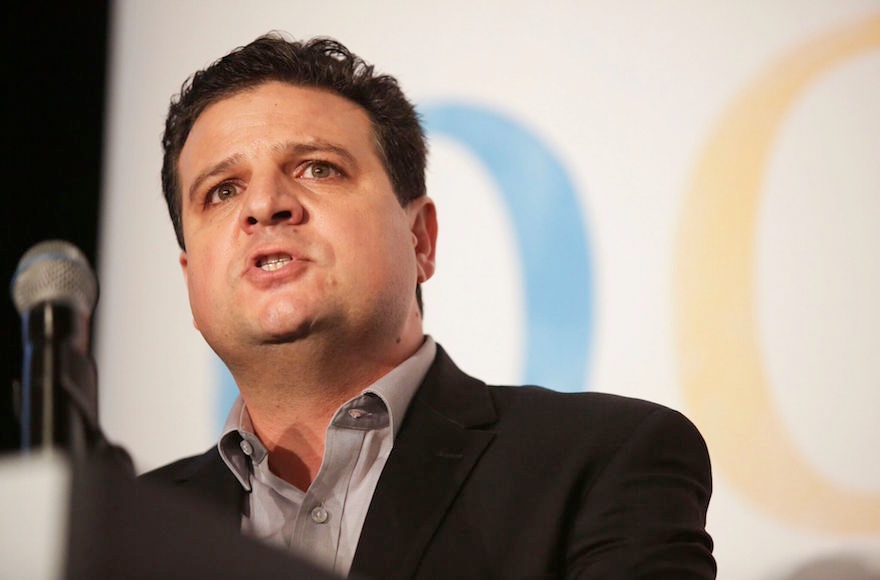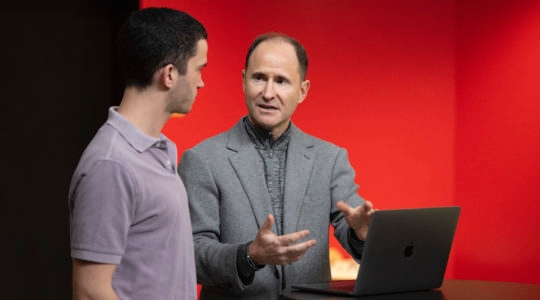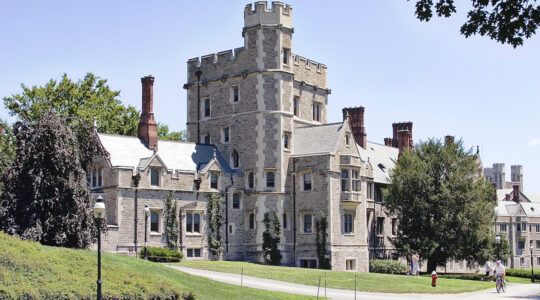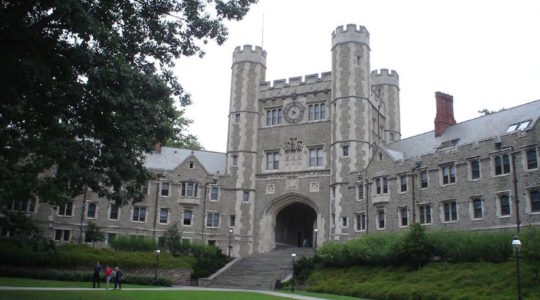WASHINGTON (JTA) — Ayman Odeh got the rapturous Jewish reception he had wanted. It just wasn’t from the Jews he had hoped to reach during his recent trip to America.
The Arab-Israeli lawmaker’s speech to a conference Sunday hosted by the Israeli daily newspaper Haaretz and the New Israel Fund, a nonprofit that focuses on civil rights in Israel, earned a standing ovation, participants said. But his message of mutual support and solidarity between Arabs and Jews, catnip as it was for the liberal room at a Manhattan hotel, did not entirely erase the bad taste left last week when he refused to enter another room in New York filled with Jews of influence.
On Dec. 10, Odeh balked at the last minute at entering a meeting convened by the Conference of Presidents of Major American Jewish Organizations because the umbrella group’s office shares space with the Jewish Agency for Israel, which facilitates Jewish immigration to Israel.
READ: Arab-Israeli lawmaker brings his message of shared history — and destiny — to America
The resulting testy exchange with the Presidents Conference leadership set off a day or so of recriminations, each side accusing the other of bad faith, scuttling one of Odeh’s missions on his first tour as head of the Joint List, the third largest faction in the Knesset with 13 seats. Odeh had hoped to recruit U.S. Jews into a civil rights era-style bid to achieve equality for Israel’s Arab citizens.
While in the United States, Odeh visited Washington and New York, and met with members of Congress including Rep. John Lewis, D-Ga., a civil rights activist, and Rep. Keith Ellison, D-Minn., the first Muslim elected to Congress. He also met with senior Obama administration officials at the White House and State Department.
Odeh’s message of common destiny did come across loud and clear at the Haaretz-NIF conference.
“Arab citizens of Israel speak Arabic and Hebrew,” Odeh said, and listed three leading Israeli poets — one an Arab, one an Ashkenazi Jew and one a Sephardic Jew. “More than anyone else, we know both people’s stories. Because I know these stories, even though it is not my story, I deeply identify with the suffering of the Jewish people, who have known hatred and terrible pain.”
As heartened as he may have been by the applause, more telling was a joint message he issued late Sunday with Rabbi Rick Jacobs, the president of the Union for Reform Judaism who had also attended the conference.
“The only future is a shared future,” the statement issued by aides to both men said. “We both understand the importance of honest, deep, difficult and necessary conversations. We were glad to meet today at the Haaretz conference to agree to work together for a better future.”
Contrast the “deep and difficult” in that statement with Jacobs’ rapturous description of his meeting Dec. 8 with Odeh at Temple Emanu-El in New York.
“MK Odeh has an inspiring vision for a brighter future for Israelis and Palestinians,” Jacobs said. “We were delighted to host MK Odeh in one of our leading houses of worship, to share with him the beauty, history, and activism of our Reform Movement, and to discuss together our shared commitment to a vision of Israel that draws from the prophets of justice and righteousness for all.”
READ: Arab-Israeli lawmaker in US refuses to enter offices shared with Jewish Agency
Jacobs’ statement was issued just a day before the dust-up at the Presidents Conference.
“Representatives of a broad spectrum of organizations came to hear him and were rightly upset by his decision not to appear, although he was in the building lobby,” the Presidents Conference statement released after the incident said.
Odeh said he could not, as a representative of Israel’s Arab citizens, enter a Jewish Agency office.
“I cannot in good conscience participate in meetings in the offices of organizations whose work displaces Arab citizens, just as in the Knesset, we do not participate in the Ministry of Defense, the Foreign Ministry, and the Ministry of Aliyah and Immigrant Absorption,” Odeh said in his statement.
A spokeswoman for Odeh said the displacement of Arab citizens cited by Odeh referred to the Jewish Agency’s affiliation with a separate entity, the Jewish National Fund, which Arab-Israeli groups have long challenged for policies they say have favored Jews over Arabs in leasing land. Arab-Israeli groups allege the policy blocks the growth of Arab towns.
The spokeswoman also said Odeh sees aliyah, the immigration of Jews to Israel, as expanding the Jewish majority in Israel at the expense of its Arab population. The Jewish Agency is responsible, with the Ministry of Absorption, for settling newcomers in Israel.
Another issue for Odeh, the spokeswoman said, is the funneling of money to West Bank settlements from another Jewish Agency affiliate, the World Zionist Organization.
Jewish organizational representatives who were stuck upstairs while Presidents Conference staff spoke with Odeh in the lobby told JTA they were taken aback. Not speaking for the record, the officials said they disagreed with Odeh on some issues, but looked forward to discussing areas where they could cooperate.
Jacobs, who was unable to make the Presidents Conference meeting, was ready to put his unhappiness with Odeh on the record.
“I am profoundly disappointed by MK Ayman Odeh’s decision to walk away from that important opportunity for him, for the cause of equality in Israel, and for the Conference of Presidents,” the Reform movement leader said after the incident.
Odeh offered to meet elsewhere, but the Presidents Conference said in its statement the request was “outrageous.” The lawmaker accused the group of stirring the pot and was especially upset by the Presidents Conference citing in its release Odeh’s contretemps with the Arab mayor of Nazareth earlier this year.
“We now understand the recent demand of the Mayor of the Nazareth, Ali Salem, that Odeh leave his city because his presence promotes divisiveness,” the Presidents Conference release said.
“I didn’t want to talk about this at all in the press, but they continued to incite against me through media outlets here in the U.S.,” Odeh said in a Facebook post.
For its part, the Jewish Agency accused members of the Joint List of being more interested in “scoring cheap and expedient political points than they are in advancing the well being of their communities.”
In a statement, its chairman, Natan Sharansky, listed Jewish Agency programs that specifically assist Israel’s Arab minorities.
JTA has documented Jewish history in real-time for over a century. Keep our journalism strong by joining us in supporting independent, award-winning reporting.






